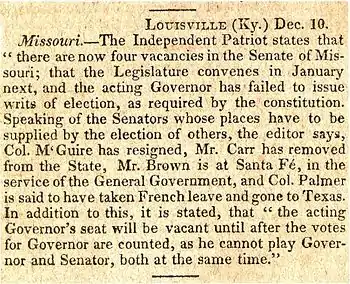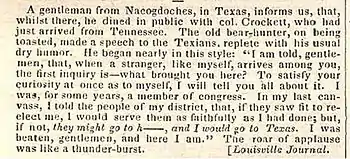Gone to Texas
Gone to Texas (often abbreviated GTT), was a phrase used by Americans emigrating to Texas in the 19th century.[1] During the Panic of 1819, many left the United States and moved there to escape debt.[2] Moving to Texas, which at the time was part of Mexico, was particularly popular among debtors from the South and West.[3]

Emigrants or their abandoned neighbors often wrote the phrase on doors of abandoned houses or posted as a sign on fences.[4][5][6][7]

While speaking in Nacogdoches, Texas in early 1836, shortly before his death at The Alamo, Davy Crockett is quoted regarding his last campaign for Congress:
A gentleman from Nacogdoches, in Texas, informs us, that, whilst there, he dined in public with col. Crockett, who had just arrived from Tennessee. The old bear-hunter, on being toasted, made a speech to the Texians, replete with his usual dry humor. He began nearly in this style: "I am told, gentlemen, that, when a stranger, like myself, arrives among you, the first inquiry is—what brought you here? To satisfy your curiosity at once as to myself, I will tell you all about it. I was, for some years, a member of congress. In my last canvass, I told the people of my district, that, if they saw fit to re-elect me, I would serve them faithfully as I had done; but, if not, they might all go to h——, and I would go to Texas. I was beaten, gentlemen, and here I am." The roar of applause was like a thunder-burst.[8]
References
- National Gazette and Literary Register - December 29, 1825, "Col. Palmer is said to have taken French leave and gone to Texas." from online source, verified 2005-12-30.
- UTSA ITC Education Scrapbook - Texas the Shape and the Name Archived 2009-11-30 at the Wayback Machine, The University of Texas at San Antonio, Institute of Texan Cultures. 1996-2001, verified 2005-12-30.
- Samuel May Williams, Early Texas Entrepreneur, Margaret Swett Henson
- "G.T.T.", The Handbook of Texas Online
- Smith, Sidney (1850). The Settler's New Home: Or, Whether to Go, and Whither?. London: John Kendrick. p. 128. Retrieved 2009-05-27.. This discouraged emigration by noting that "'Gone to Texas' has become the proverb for a scamp#PPA674,M1
- Thirty years' view; or, A history of the working of the American government for thirty years, from 1820 to 1850 (Vol. 1)Benton, Thomas Hart (1854), New York: D. Appleton and Company, p. 674 Missing or empty
|title=(help) - South-Western Immigration Company (Austin, Texas) (1881). Texas: Her Resources and Capabilities. New York: E.D. Slater.. This encouraged migration to the state of Texas and remarked on the "slang use" of the term a "generation ago" to refer to fugitives from justice.
- Niles' Weekly Register - April 9, 1836
Further reading
- Campbell, Randolph (2003). Gone To Texas - A History of the Lone Star State. Oxford University Press. ISBN 0-19-513843-0.
- Hughes, Thomas (1884). G. T. T. Gone to Texas: Letters from Our Boys. New York: MacMillan. Retrieved 2009-05-23.